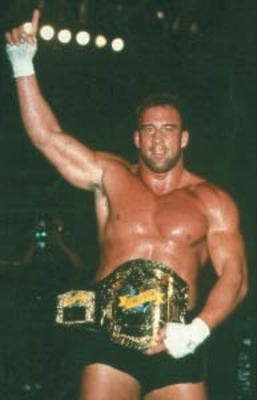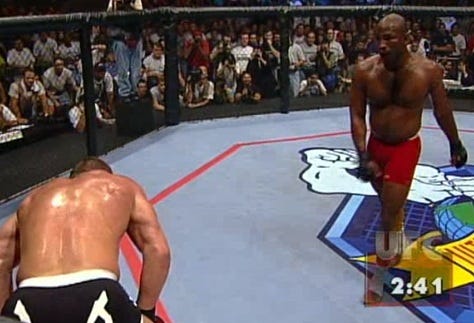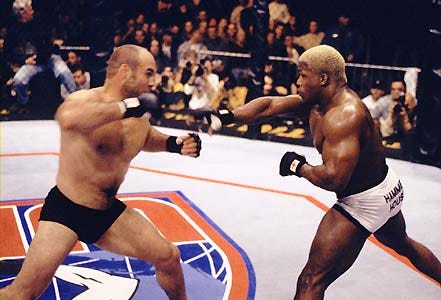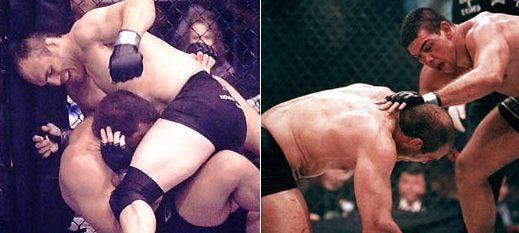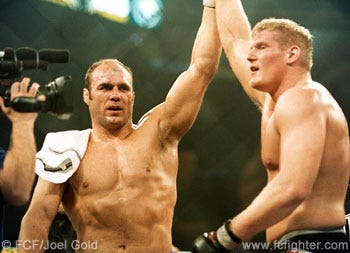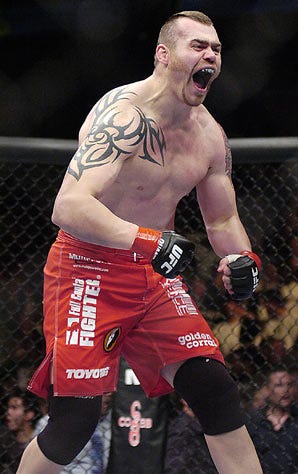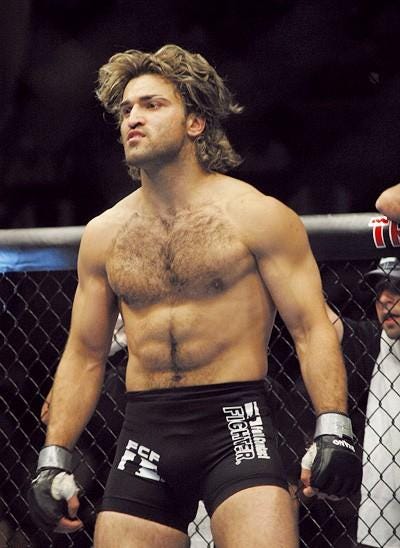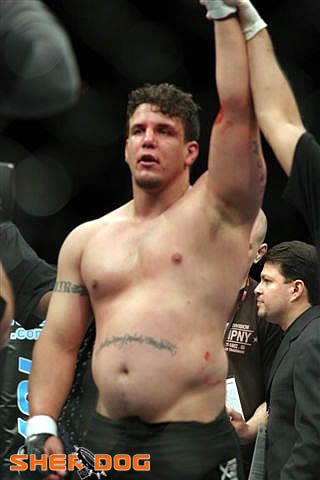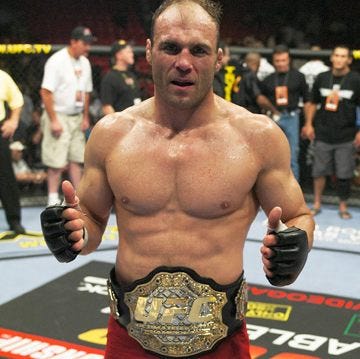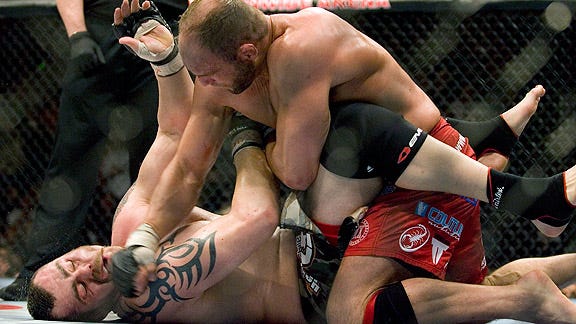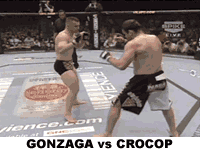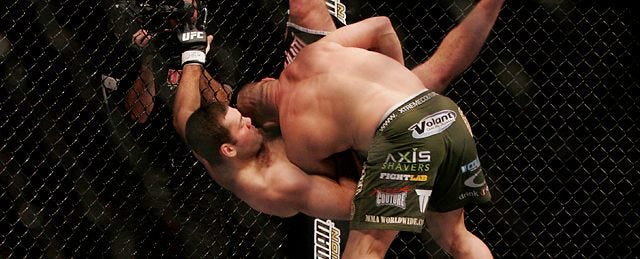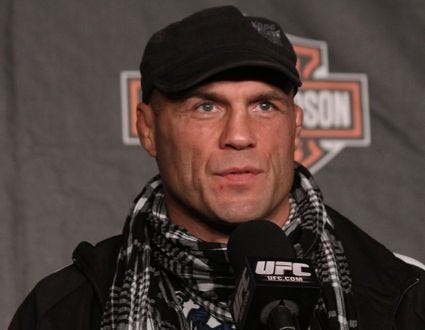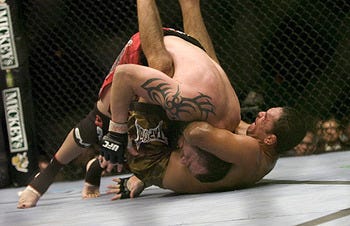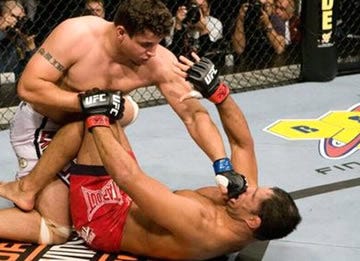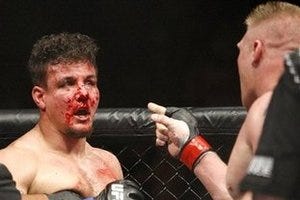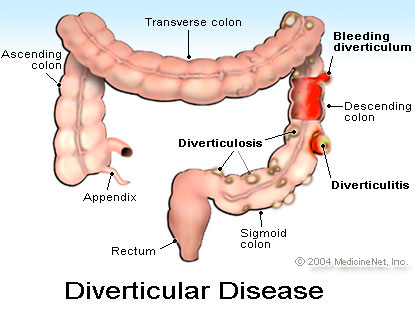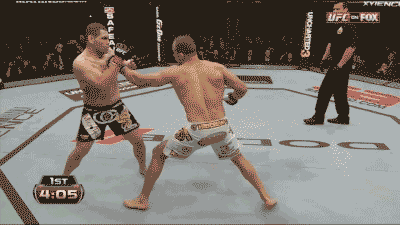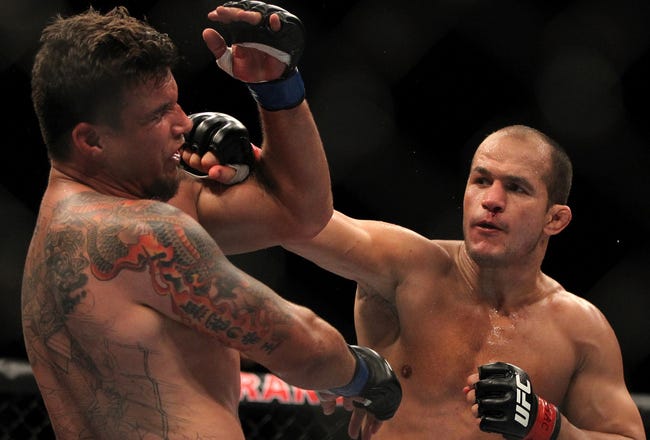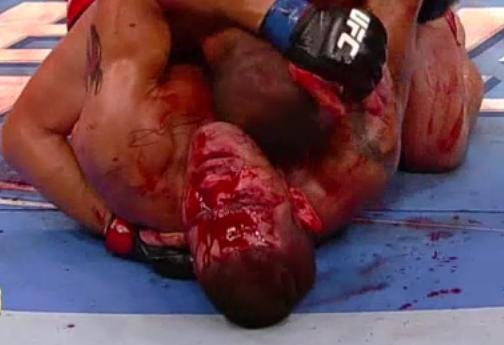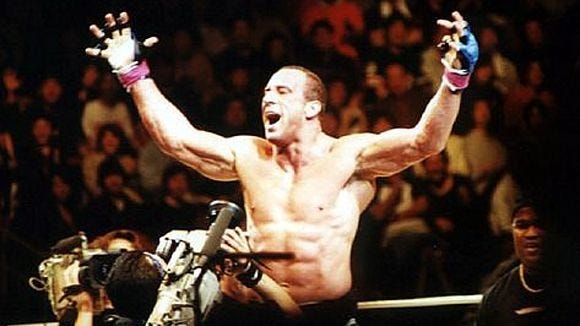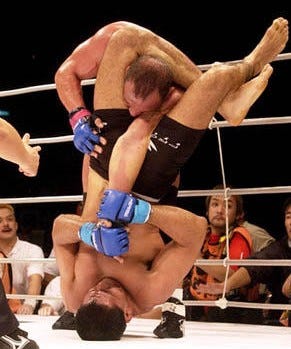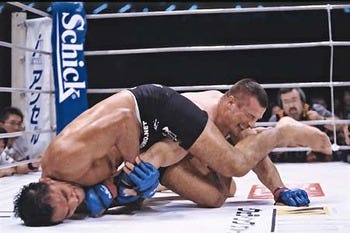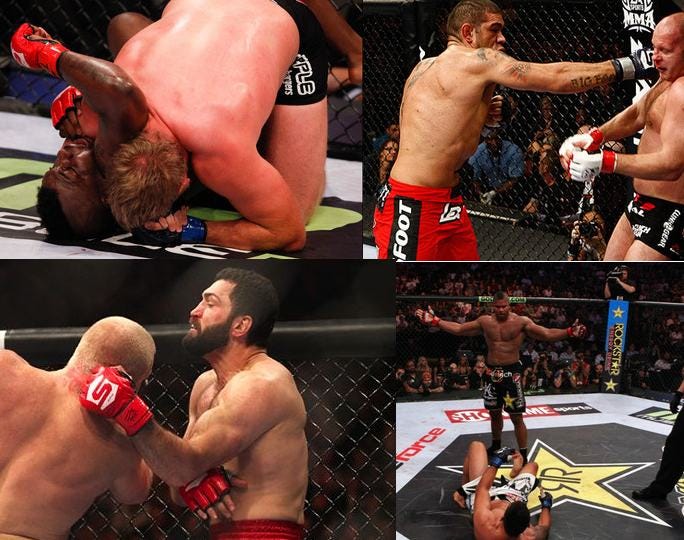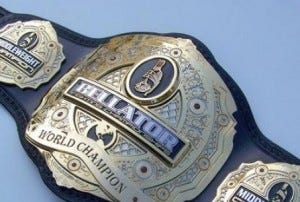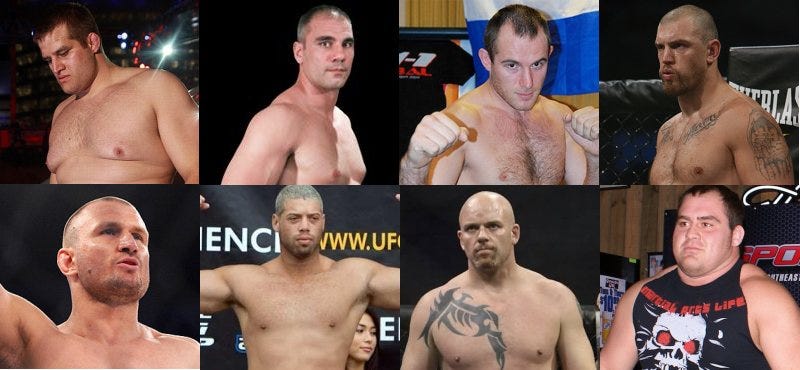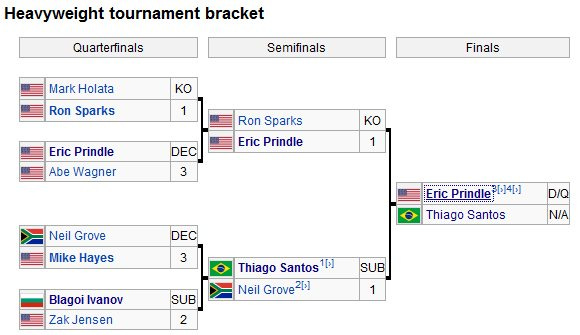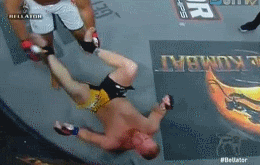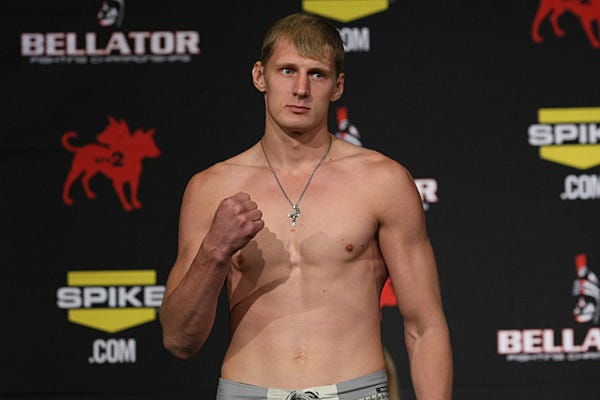The Tragedy of Trashweight: Volume 1
A heavyweight championship history, 1993-2013.
A PRESENT DAY NOTE FROM THE AUTHOR: Hi there! We’re doing something a little different today.
Some of the people reading already know this and some do not, so for the benefit of the latter: My first writing on the topic of mixed martial arts came from the den of scum and villainy that is/was the Punchsport Pagoda, the wrestling/MMA section of the Somethingawful forums. (We’re still there, come say hi.) If you’ve ever wondered why Carl’s Fight Breakdowns on this substack start at episode 20: This is why.
Just a hair over a decade ago—January 18, 2013, to be precise—I wrote The Tragedy of Trashweight, a thorough but silly run-through of the major heavyweight championships of mixed martial arts between the inception of the UFC in 1993 and the industry at the end of 2012. It was intended to serve as a guide to how consistently, hilariously broken the heavyweight division could be. But it was also a gag for a group of internet buddies, and I hadn’t thought much about it since.
Until, at the beginning of 2023, the UFC fired their own heavyweight champion, ended the longest title lineage in the sport, and declared the new championship to be undisputed and sacrosanct.
Stricken by obsession, I over the past month put together a second volume to bring the story up to the present day, but obviously, publishing it here would have been silly with half of the story missing. So, for the next 48 hours, we’re running a couple special editorial editions of the Punchsport Report.
Today we have that original, ten year-old forum post. I re-edited it to fix some typos, replace some broken images, and cut out some really shitty fat jokes, because it turns out 2013 Carl had some projection issues with his injury-induced weight gain and was being an internet jerk about it, but I left my generally less good writing as intact as possible. Tomorrow morning, before the UFC takes the stage, we’ll have the sequel that brings us to the present day.
So: Please enjoy 2013 Carl’s work on The Tragedy of Trashweight: Volume One.
Heavyweight has traditionally always been the worst division in combat sports. The athletic big men of the world will always have more profitable sports to turn to that include the fringe benefit of not getting punched in the face for a living. The division is kept alive by the presence of a merry few faithful who are just sufficiently broken in the head to actually want to do this.
These are their stories.
The UFC Heavyweight Championship is the oldest active championship in major league mixed martial arts. Its lineage dates back to the old, tournament-based UFC events, where Ken Shamrock and Dan Severn put on one of the worst exhibitions in combat sports history to create the Superfight championship. Our story picks up with the unification of the UFC Superfight and Tournament championships to create the UFC Heavyweight Championship, carried on its rightful place around the waist of our lord and savior:
Mark Coleman, the greatest fighter the world will ever see.
Coleman had torn through six other fighters--three of them in one night--with his then-unheard-of ability to wrestle men to the ground and use brute strength to crush them. He was an unstoppable force, and few were considered capable of defeating him.
Maurice "Mo" Smith was not one of them.
A comparatively unthreatening kickboxer who at the time had an MMA record of 4-7, Maurice Smith introduced the world to the art of sprawl and brawl--refusing to engage in grappling, defending takedowns and making space to strike from the outside. He dragged Coleman through a full 21 minutes of fighting, by the end of which Coleman barely had the gas to stay standing, and won the fight and the championship with it. Coleman would lose his next two UFC fights, wash out of the organization and travel to Japan to continue his career--we'll come back to that later. Smith had the first successful heavyweight title defense in the organization against noted boy band enthusiast Tank Abbott before himself being defeated by another wrestler, and the man who, for better or worse, is the most enduring face of the UFC heavyweight division:
Randy "The Natural" Couture.
A Greco-Roman world champion wrestler, a sergeant in the US Army, a three-time Olympic alternate and the man who made his MMA debut by choking out Ludvig Borga and TKOed the then-nightmarish Vitor Belfort, Randy Couture was tailor-made to be the face of the UFC. He would, eventually, excel at it, playing a clutch role in the UFC's explosion into the mainstream.
But years before all of that, he was the man who started the trashweight curse.
After winning the title from Smith, the UFC brass began planning his next defense against one of the most popular heavyweights in the world and Japan’s heavyweight King of Pancrase, Bas Rutten. Couture refused, instead signing with Vale Tudo Japan, intent on winning their 1998 tournament. (He failed: He was submitted in ninety-nine seconds by Enson Inoue and thereafter entered fellow Japanese organization RINGS, where he was submitted again in a touch under eight minutes.) For the first time, the UFC Heavyweight Championship was stripped and would not be claimed until a year and a half after its last appearance, when the aforementioned Bas Rutten and Mark Coleman's teammate Kevin Randleman fought to fill the vacancy. Rutten won in what at the time was a very controversial decision: Randleman took him down and controlled him, but Rutten was judged the more active and threatening fighter. Bas was an ideal champion: A talented, charismatic and exciting fighter with international popularity.
So, of course, he vacated the title, attempted to drop a weight class to address nagging injury issues and ultimately decided to instead retire from competition altogether.
Randleman would win the title and, as the fifth champion, become just the second to successfully defend it, taking decisions over Pete Williams and Pedro Rizzo. He was defeated, however, by the man who would go on to have the then-greatest reign in UFC heavyweight history:
Randy Couture came back to the UFC for an immediate title shot at Randleman, and after being on his back for the first two rounds of the fight scored a TKO victory in the third. Per his contract he still competed in the RINGS King of Kings 2001 tournament that February--where he again fell short, choked out in under a minute by Valentijn Overeem in the penultimate round. (The tournament would be won by a little-known heavyweight, Antonio Rodrigo Nogueira.) Still, Couture came back to the UFC to defend his championship, and the challenger on deck was Pedro Rizzo, the tough, well-rounded Brazilian who'd just knocked out Josh Barnett. Their fight was scheduled for UFC 31, the first card held under the new owners of the UFC, Zuffa, which introduced the world to the Fertitta brothers who owned the company and their president, Dana White.
What followed was one of the best fights in the history of the heavyweight division. It was a back-and-forth affair, with Couture grounding Rizzo and nearly pounding him out in the first round only for Rizzo to put him down with a punch and nearly knock him out in the second. After a full five rounds, Couture was declared the winner. There were many fans who felt Rizzo should have taken the decision, and Zuffa was eager to make more money, thus their rematch was signed for UFC 34 six months later. Couture had learned greatly from their first fight, grounding Rizzo repeatedly and TKOing him in the third round. With his pair of victories over Pedro Rizzo, Randy Couture became the first man to defend the UFC Heavyweight Championship twice. He would be the only man to do so for half a decade.
In the interim, the curse resurfaced.
12-1 prospect Josh Barnett dethroned Couture with a second-round TKO. In some strange, alternate universe, Barnett went on to become the best champion the division had seen: He was a large, reasonably quick heavyweight with good wrestling, very good grappling and serviceable striking, and having won a world championship at just 24 years of age had a long UFC career ahead of him.
In our universe he tested positive for anabolic steroids, was immediately stripped of the belt and fired, and fled to Japan to part-time as a professional wrestler.
Couture was matched up with the 13-1 Ricco Rodriguez to fill the title vacancy. Rodriguez came back from a score deficit and defeated Couture in the fifth round, breaking his orbital socket with elbows and forcing him to submit. Rodriguez, a jiu-jitsu black belt and Abu Dhabi Combat Club champion, was seen as another possible standardbearer for the division.
He would instead be knocked out just three minutes into his first title defense. He was never again relevant to the world of MMA. He developed a cocaine problem, joined the cast of VH1’s incredibly exploitative reality show Celebrity Rehab and in by far the high point of his career admitted on national television to crashing his car and pulling his seemingly dead girlfriend into the driver's seat so she would take the rap.
The man who knocked him out would, later, be briefly considered the greatest UFC heavyweight champion yet:
Tim "The Maine-iac" Sylvia, whose nickname comes from the fact that Tim Sylvia was born in Maine.
Sylvia, a 6'8" former bouncer, had sold all of his possessions and moved to Iowa in 2000 to become an MMA fighter under Pat Miletich. His teammates disliked him, most speaking of him as an astonishingly insecure man—but his teammates were, in fairness, jerks. His size and relative talent brought him success in the heavyweight division, leading to a record of 15-0 after his championship victory. For his first defense he was matched up against the 6'10" Gan McGee, one of the few fighters larger than he. Sylvia TKOed him in just under two minutes, the first successful heavyweight title defense since the second Couture-Rizzo fight two years earlier.
He then tested positive for anabolic steroids and was immediately stripped of the belt.
It was nine months before the title was once again taken. The returning Tim Sylvia (who was very, very sorry and swore he'd never do it again) met submission fighter Frank Mir. Fifty seconds into the fight, Mir locked on an armbar that broke Sylvia's arm in four places. Referee Herb Dean stopped the fight on the spot, and Frank Mir became the tenth UFC Heavyweight Champion.
A few months later, Mir was struck by a car while riding his motorcycle, broke his leg and tore apart every ligament in his knee. It would be almost two years before he returned to the sport.
Tim Sylvia once again fought for the title, this time an interim championship, but was once again submitted in less than a minute by the man who would become the face of the heavyweight division during the UFC's emergence in mainstream America.
Vampire-teeth mouthpiece not pictured.
Andrei "The Pit Bull" Arlovski, a Belarussian Sambo champion and would-be boxer. Arlovski was a good face during the UFC's emergence as a sport--a photogenic, in-shape heavyweight whose fights had never gone to a decision. He became the first man since Couture to successfully defend the championship twice. As the interim champion he destroyed prospect Justin Eilers, breaking his nose, both of his hands and tearing his ACL, and after simply being promoted to the status of undisputed champion when it became clear Frank Mir would not be returning to challenge him, he knocked out Paul Buentello in just fifteen seconds. Tim Sylvia, on a three-fight win streak, was granted his request for a rematch with the champion.
At this point, Arlovski had only three losses in his career, all coming by KO/TKO. At the time few had actually seen those fights, especially with the sudden influx of new fans and the lack of MMA media on the internet. Most fans knew nothing about his questionable chin, knowing him only as the present-day wrecking machine that beat everyone in front of him. The Sylvia rematch appeared to follow this pattern, as in two minutes Arlovski floored Sylvia and had nearly stopped him before he got back to his feet.
Then, this happened:
Tim Sylvia then began the most-hated title reign in the division's history. A rubber match was immediately ordered between Sylvia and Arlovski--depending on who you asked, it was either an attempt to provide closure to a great MMA feud or a desperate attempt to get the strap back on the more marketable champion. Sylvia/Arlovski 3 was possibly the worst title fight since Severn/Shamrock more than a decade prior. Both men had stopped the other, and in their previous fight both had been dropped within minutes. Consequently, they fought with so much fear and respect that they barely fought at all. After five of the most painful rounds in memory Sylvia won a unanimous decision. He would become only the third champion to record two successful defenses, scoring a similarly mind-numbing unanimous decision over Jeff "The Snowman" Monson.
This earned him incredible scorn from the fans, as at 5'9" Monson, a submission grappler with almost no striking game to speak of, was giving up just shy of an entire foot of height and reach to Sylvia, who nonetheless jabbed him to a low-damage victory.
Sylvia's reign passed through February 7, 2007, the tenth anniversary of the UFC Heavyweight Championship. Those first ten years produced twelve title reigns, one interim reign, five title vacations and a combined nine title defenses. Sylvia was by far the most-hated heavyweight champion the UFC had--which put them in a difficult position. After two straight defeats, one of which was a disaster, there was no interest in Arlovski, the most popular heavyweight, getting yet another rematch. The UFC had hoped for a rematch with the recently-returned Frank Mir, but this fell apart when Mir came back grossly out of shape and clearly unmotivated, leading him to a pair of embarrassing losses.
The UFC's hopes turned instead to Brandon Vera, the man who blew Frank Mir out in a minute, an ultra-promising prospect with an 8-0 record. Vera, however, fell victim to his own hype, proclaiming himself the future heavyweight and light-heavyweight champion, and banking on his momentum and the UFC's lack of challengers he refused to sign the title fight until the UFC renegotiated his contract to give him considerably more money and exposure.
Instead, as so often happens in America, the UFC decided to air a rerun.
Now with less hair than ever.
After his loss to Ricco Rodriguez, Randy Couture had dropped down to the light-heavyweight division, where he embarked on the most famous fights of his career--winning the vacated light-heavyweight championship in an upset over Chuck Liddell, dominating Tito Ortiz and trading a pair of fights with Vitor Belfort before being bested by Liddell twice. After the third Liddell fight, at 42 years old, Couture announced his retirement. He was inducted into the UFC hall of fame, took on a role as an on-air personality and began dabbling in acting and submission grappling. The lure of the spotlight, the spectacle and a shitload of money in a desperate attempt to get a big name in the title picture coaxed him out of retirement, and on March 3, 2007, Couture returned to competition, the UFC and the heavyweight division, sliding directly into a shot at Sylvia's belt. Many analysts at the time saw it as a publicity stunt--hated or no, Sylvia was the dominant champion and a 6'8", 23-2 fighter facing a 43 year-old who'd just been washed out of a lower weight class.
It didn't quite work out that way.
In front of what is still one of the loudest crowd reactions I've ever heard, Couture won a unanimous decision over Tim Sylvia, ending his reign and the relevant period of his career. Sylvia would win one more UFC fight against the still-modestly-paid Brandon Vera before washing out and hitting the independent circuits, where he would be destroyed by Fedor Emelianenko and knocked out in nine seconds by a 47 year-old Ray Mercer making his professional MMA debut.
Couture's victory was a big mainstream success for the UFC. Adding to this was the emergence of the first genuinely compelling heavyweight contender the UFC had seen in several years. The organization had successfully courted international superstar Mirko "Cro-Cop" Filipovic away from their primary competitor, Pride FC, and had great plans of giving him a couple of victories before matching him up with Couture in what would be a legitimate superfight. Cro-Cop was given a pair of favorable matchups to achieve this goal, one against pudgy brawler "The Manic Hispanic" Eddie Sanchez (yes, really), whom he defeated easily, and one against little-known grappler Gabriel Gonzaga, then on a three-fight win streak within the UFC.
It didn't quite go as planned.
Gonzaga's gigantic upset over Cro-Cop set him up for an immediate title shot. Once again, popular opinion turned on Randy--now 44 years old, he was giving up a considerable amount of mass and fifteen years of age to Gonzaga, who with his clear striking power and submission grappling ability presented the kind of threats that had beaten Randy before.
In fairness: They were almost right.
Despite taking a high kick from Gonzaga that snapped his ulna in half, Couture used a combination of takedowns, boxing and clinch work to neutralize Gonzaga, scoring a TKO victory in the third round after a takedown broke Gonzaga's nose. It was a new high point for Couture's career, and a new height of popularity for the heavyweight division.
Which is unfortunate, because then things got really, really stupid.
The scarf is the mark of a terrible man.
At the height of his career resurgence, Couture resigned from the UFC. He would claim a number of reasons: Chuck Liddell was getting paid more than him, bonus checks weren't being honored, the UFC contract was unfairly restrictive, the UFC promised him it would sign Fedor Emelianenko but failed. The UFC disputed his claims and at one point held a press conference dedicated primarily to claiming Randy was full of shit, including paystubs disproving his complaints. They successfully sued him for damages and barred him from competing with other organizations, all the while denying that his contract was severed and insisting that he was very much still the heavyweight champion--as stripping him would have ended the champion’s clause that let them repeatedly extend his contract.
While this was all going on, the face of the division changed considerably. Primary UFC competitor Pride FC had collapsed, causing an influx of talent to the UFC that included Antonio Rodrigo Nogueira, a top 3 heavyweight who had almost fought Couture nearly a decade prior at the 2001 King of Kings tournament. In early 2008, he fought Tim Sylvia for the UFC's interim heavyweight championship, a patch to tide fans over while they worked out issues with Couture. In what would be Sylvia's last fight with the UFC he put on an aggressive performance, knocking Nogueira down twice and briefly seeming set for another reign--but then, abruptly remembering that he was Tim Sylvia, he jumped on the jiu-jitsu black belt and almost immediately got choked out.
Actual comment from Tim Sylvia on the fight: "I hate jiu-jitsu."
Nogueira became the second-ever interim heavyweight champion. Later that year, however, the UFC ran into a snag. They had worked out their contractual issues with Couture and signed him back into competition, bringing the undisputed heavyweight title back into contention--but they had also already begun filming a new season of their flagship television series The Ultimate Fighter that pitted Nogueira against Frank Mir, who had come back from his failed comeback and after a pair of victories was ready to challenge for the title. Their fight was set in stone, leaving Couture to instead defend the undisputed title against the last man Mir had defeated, a new, popular addition to the heavyweight roster.
Yes, it's basically a dick.
In an odd bit of irony, Lesnar had actually been scheduled to have his second UFC fight against our old friend Mark Coleman, the original heavyweight champion and recent returning UFC alumnus, but a training injury caused him to fight Heath Herring instead. A dominant victory and his clear mainstream popularity earned Lesnar the shot at Couture.
After a somewhat competitive first round Lesnar stopped Couture in the second, becoming the fourteenth heavyweight champion. Much wailing and gnashing of teeth was had at the professional wrestler with a record of 3-1 as UFC champion, but the internet was soothed by the (now totally insane) interim title defense the following month between Nogueira and Mir. Nogueira, as a humble imported heavyweight sensation, was a darling and a sizable favorite, while Mir, as an inconsistent and seemingly inferior fighter in every way (who was also kind of a dick) was expected to lose.
The article I found this picture on was about how Mir only won because Nogueira had a staph infection and would totally beat him any other time.
After a storied career that saw him surviving bouts with some of the biggest and scariest heavyweights in the history of the sport, Frank Mir became the first man ever to knock out Antonio Rodrigo Nogueira, stopping him in two rounds. After the fight, he called out Lesnar for having his belt.
The fight was a dream situation for the UFC. The most popular heavyweight in the sport's history, having just beaten the second-most popular heavyweight in the sport's history, now had a grudge rematch against a legitimately threatening opponent--and all of this was happening just in time for UFC 100, the biggest event they'd ever put on. While the public was solidly behind Lesnar, the internet put most of its faith in Frank Mir: He'd beaten Lesnar before, Lesnar had not been tested again since that fight, and additionally he had a tattoo of a dick on his chest and used to do pro-wrestling.
Lesnar recorded an extremely definitive TKO victory in just two rounds. It was the biggest fight in UFC history, on the biggest show in UFC history, with quite possibly the most popular fighter in UFC history--and, with a successful defense to his name, it legitimized Lesnar as a champion. After almost twelve years of existence, the heavyweight division had its superstar.
And then: Poop.
Pictured: The new heavyweight champion.
Lesnar was sidelined with what at first was mononucleosis and later discovered to be diverticulitis, a crippling intestinal disorder made worse by the discovery that in Brock's case there was literally shit leaking through his intestines and contaminating his body. He was going on the shelf, and wouldn't be ready to fight for at least a year.
The UFC scrambled to put together yet another interim title fight. Frank Mir had picked up a victory over perennial gatekeeper Cheick Kongo and fast-rising prospect Shane Carwin was riding a streak of eleven straight victories, every one of which came by first-round knockout. Having seen how well it worked out the first time, the UFC decided to once again book Frank Mir against a huge, punchy wrestler for yet another interim championship.
This fight is essentially a snuff film.
Carwin murdered Mir in an impressively gruesome stoppage, with Dan Miragliotta standing by and waiting patiently for Mir to expire from repeated blunt force trauma before stepping in. By that Summer Lesnar was good to go, and on July 3, 2010, Lesnar fought in both his second title defense and second title unification. It was a scary bout for Lesnar fans, as Carwin knocked him down with an uppercut and nearly pounded him out in the first round--to the extent that many still argue the fight should have been stopped--but referee Josh Rosenthal believed Lesnar was intelligently defending himself and allowed the fight to continue. Lesnar weathered the storm, and after his flurry Carwin was so incredibly gassed out that he would later claim he couldn't lift his arms. In the second round Lesnar took him down and submitted him with an arm triangle, ruining his undefeated record, reunifying the heavyweight title, and putting him in the vaunted club of heavyweight champions with two title defenses. There was another prospect waiting for him: A lighter, faster heavyweight named Cain Velasquez, who at 8-0 with a vicious knockout victory over Nogueira was the newest #1 contender. That October, Velasquez got his shot at Lesnar's belt.
It wasn't pretty.
Velasquez had long been heralded by all of his training partners as the uncrowned heavyweight champion. The fight realized his claim, as he very literally punched Lesnar from one side of the cage to the other, TKOing him in one round. The UFC eyed his first title defense against clear #1 contender Junior dos Santos, but Velasquez tore his rotator cuff in the Lesnar fight, putting him on the shelf for most of the next year. The UFC instead booked dos Santos against Lesnar as the coaches for the new season of The Ultimate Fighter, with the two expected to face off as the show's climax. Instead, Lesnar was once again diagnosed with a return of his diverticulitis, sidelining him indefinitely and leaving dos Santos to murder an overmatched Shane Carwin in slow motion. (After another full year off Lesnar would return to fight Alistair Overeem, who defeated him in one round, after which Lesnar immediately retired.)
With Velasquez off the shelf, dos Santos triumphant and the UFC having just signed a groundbreaking network television deal with Fox, the stage was set for what they expected to be the biggest heavyweight fight since Lesnar/Mir II two and a half years prior. Fox gave them an hour on primetime for the fight--despite the UFC assembling a very impressive card for the event, Fox refused to air any fight but the main event, expecting lengthy fireworks between the undomitable Velasquez and the hard-punching dos Santos.
The fight lasted one minute.
dos Santos dropped Velasquez with a single hard shot and finished him seconds later on the ground, winning the championship away. It would eventually come out that Velasquez suffered a bad knee injury just before the fight, but refused to disclose it or make excuses for the fight, and in fact was furious when word of the injury leaked out. While the fight hadn't been the barnburner the UFC needed, it remained a victory--dos Santos had knocked out the world chapmion in extremely impressive fashion on primetime network television, and was in position to be a superstar.
Unfortunately, he had torn his meniscus, and had to go on the shelf for surgery.
His first title defense was scheduled for May 26 against Alistair Overeem, who was coming off his aforementioned destruction of Lesnar. Overeem had been seen by most as the top heavyweight outside the UFC, so this was a dream fight for many fans. Said fight was then scuttled a month and a half before it was to take place, when Overeem failed a pre-fight drug test and was denied a license to fight.
Really, this guy. Can you believe it?
There was only one guy available and in a position to take the fight--our old buddy Frank Mir, who after the Carwin loss was riding a three-fight win streak that included a rematch with Nogueira in which Mir once again stopped him, this time snapping his arm with a kimura and becoming the first man ever to submit him in MMA. As an additional wrinkle, dos Santos was a member of Nogueira's fight team and cites him as his personal hero, making him all the more pleased to avenge his teacher.
The fight was not close.
dos Santos battered Mir liberally before finishing him by TKO in the second, giving him the first successful heavyweight title defense in two years. On the co-main event of the same card Cain Velasquez made his return to the octagon by destroying the kind-of-sort-of contender Antonio "Bigfoot" Silva in one of the bloodiest beatings the UFC had seen.
0.8 Muta.
This set up the hotly-anticipated rematch between dos Santos and Velasquez for December 29, 2012. While there was some considerable debate about the likely outcome for the fight, the betting lines very noticeably and understandably favored dos Santos, given his quick disposal of Cain beforehand.
The betting lines were very, very wrong.
Velasquez nearly finished dos Santos in the first round, then proceeded to beat him for the entirety of the fight, putting forth so one-sided a fight that all talk of a rubber match was scuttled until dos Santos can rack up another win or two and make it clear that he has something to offer.
As of Velasquez/dos Santos II, there have been seventeen undisputed heavyweight championship reigns in the UFC, four interim title reigns, five title strippings and only thirteen successful title defenses, five of which are accounted for by Pedro Rizzo and Frank Mir alone. Two champions have been caught using steroids in their fights. Only four champions have managed to string together two successful defenses before dropping the belt. Brock Lesnar has the longest reign in the belt's history; Velasquez will have to hold onto the title until December of 2014 to beat his record.
The trashweight curse proved too big for the UFC. Truly, wherever large men punch each other for money you will find its presence. The most notable examples, however:
Operating out of Japan, Pride Fighting Championships was, at one time, the world's biggest MMA organization. They were the UFC's primary opposition, and came into prominence during the "dark age" of the UFC, when John McCain's quest to end MMA and parent company SEG's financial woes saw the organization at its weakest.
At the same time, Pride was holding what may have been the best tournament in MMA history, the 2000 Openweight Grand Prix. A sixteen-man tournament that included professional wrestlers, poorly-trained sumo veterans and a good old-fashioned screwjob, the winner was, nonetheless, the greatest fighter:
Mark Coleman, on a four-fight losing streak (one of which was a fake fight perpetrated by future fellow tournament competitor and professional wrestler Nobuhiko Takada), made an unexpected resurgence and won the tournament. Coleman was once again called to fight in a unification bout, meeting the 2000 RINGS King of Kings tournament champion to create the Pride Heavyweight Championship.
It didn't go his way.
Coleman was submitted in the first round by Antonio Rodrigo Nogueira, who became the consensus #1 heavyweight in the world. After winning the title, Nogueira went on to win his next six straight fights, all but one of which took place in Pride. This included impressive victories over Heath Herring, Semmy Schilt, Dan Henderson and Bob Sapp.
However: None of them were title defenses.
Innovating the art of champions not defending their titles almost a decade before Bellator would perfect it, Pride booked Nogueira in numerous fights but never with the title on the line. Having won the title on September 24, 2001, Nogueira's first defense would not come until March 16 of 2003.
It didn't go his way.
Nogueira ran into Fedor Emelianenko. Fedor was the best heavyweight the world had to offer at the time, and himself went on to win several non-title fights, but an injury and Pride's desire to make money led to an interim title bout between his two biggest contenders, Nogueira and Mirko "Cro-Cop" Filipovic, Japan's most popular heavyweight. Pride officials hungrily eyed the possibility of a Fedor/Cro-Cop showdown.
It didn't go their way.
Despite winning the first round, Cro-Cop was submitted in the second. It was the first loss of his career. Rather than having Fedor and Nogueira unify the title, Pride put them both into their 2004 Heavyweight tournament--again, with the presumed hope that Cro-Cop would win and set up the fight they actually wanted. Instead, Cro-Cop was upset in the first round and Fedor and Nogueira were the last men standing, setting what was, despite the bullshit that got them there, an epic rematch: Champion, interim champion, consensus #1 and #2 heavyweights, tournament finalists.
It didn't go anyone's way.
Three minutes into the fight a headbutt opened a massive cut on Fedor. As it was ruled unintentional, the fight was declared a no-contest. The championship and tournament were put on hold for four more months, when they finally had their rematch. Fedor won another unanimous decision victory, marking his first title defense--only nine fights and nineteen months after winning the belt. Pride would only exist for two more years, and Fedor held the belt for the duration, successfully defending two more times: Once against Cro-Cop in August of 2005, once against Mark Hunt in December of 2006. As a result of Pride's matchmaking Fedor's title reign, despite spanning nearly four years and fifteen fights, includes only three actual defenses.
Then, this happened:
dinner plate fighting championships
The World Alliance of Mixed Martial Arts was an incredibly dumb attempt by a group of exceedingly silly businessmen to usurp the UFC as the center of the sport by declaring themselves the One True MMA Championship, one that would exist beyond organizations. The belt was created specifically for Fedor, and was technically won and defended by him twice, but it's funnier to just point out that, at the time WAMMA was declaring Fedor the #1 heavyweight under their all-important rankings, this was an actual photograph of their office:
No one gave a shit about WAMMA, it folded without a word and was never heard from again.
The Strikeforce Heavyweight Championship was the funniest yet. Strikeforce was a regional kickboxing promotion that had jumped into the mainstream by picking up the carcass of failed UFC competitor EliteXC--whose heavyweight belt itself would later exist for exactly one fight, won by Antonio "Bigfoot" Silva who tested positive for steroids and was immediately suspended--but before they signed their network deal, they crowned their first-ever heavyweight champion on a November 2007 card only streamed online on Yahoo. Former Pride light-heavyweight standout Alistair Overeem met Strikeforce's top heavyweight Paul Buentello in what ended up being a one-sided affair.
It would be almost three years before Overeem returned to Strikeforce. Frustrated by their inability to find him fights, Overeem returned to Japan and his home in the Netherlands, fighting for smaller promotions Dream and Glory. He was booked to defend his title against Strikeforce standout and overweight tire salesman Brett Rogers in late 2009, but after getting into a barfight in defense of his brother injured his hand and could not compete. Rogers would instead fight Fedor for the prestigious WAMMA belt in a surprisingly competitive affair; Overeem defended the title against Rogers after the loss, and afterward called out Fedor for refusing to challenge him for the title. In five years of existence, it was the only defense the Strikeforce heavyweight title would ever see.
Fedor lost to Fabricio Werdum the following month, and with all of their plans blown Strikeforce decided to instead double down on their fucked-up heavyweight division, launching an eight-man tournament featuring Emelianenko, Overeem, Werdum, Rogers, Bigfoot Silva, Andrei Arlovski and former Pride standouts Josh Barnett and Sergei Kharitonov. The tournament also included three reserve bouts, crowning Chad Griggs, Shane del Rosario and Valentijn Overeem as replacements should competitors become injured.
The tournament was a clusterfuck from conception alone--half of its fighters had already battled each other at one point or another and, despite the reward for victory being a shot at the championship, Overeem was still the champion and was himself a participant. Questions abounded: Was he defending the title in every fight, if so were his fights five rounds instead of three, if he was eliminated in the first round would he then still fight the winner, etc. Strikeforce could never quite settle on proper answer: At one point he was defending the title in every fight, then he was defending the title but only in three-round fights, then he would only defend the title in the final.
In the end, it didn't matter.
Three of the four popular heavyweights--Arlovski, Fedor and Rogers--all lost in dominant fashion. Overeem and Werdum had one of the worst fights in heavyweight history, with Werdum repeatedly buttflopping to the canvas to avoid a striking exchange and Overeem repeatedly waving him up en route to winning a decision. Overeem then had a spat with his management, Golden Glory, over the method by which they took their pay from his purse, and that combined with the lure of the UFC led to him departing the tournament and Strikeforce entirely, leaving the heavyweight title vacant and a spot in the semifinal round open.
Instead of putting any of their three reservists in, Strikeforce held another, separate reserve bout and slotted in its winner, undefeated wrestling prospect Daniel Cormier.
chad griggs will never see justice
Cormier went on to knock out Bigfoot Silva and decision Josh Barnett, winning the tournament. Despite the vacancy of their heavyweight title, Cormier was given an entirely different tournament championship belt. The Strikeforce heavyweight title was never mentioned again, and the organization ceased operations after their final card just last week.
Bellator Fighting Championships was founded in 2008. It presented a focus on the tournament format, most specifically aimed at lighter weight classes--for the first year and a half of its existence, middleweight was its largest. This ended in its third season with the creation of the Bellator heavyweight division, which promised the best heavyweight action you'd see outside the UFC.
It was a compelling argument.
The tournament was dominated by "The Polar Bear" Cole Konrad, a multiple-time NCAA wrestling champion and undefeated mixed martial artist. Konrad wrestled his way to victory, taking less-than-thrilling decision victories in the first two rounds and scoring a keylock submission in the final, becoming Bellator's first heavyweight champion.
Having won the title, Bellator did the only thing that made sense: They put Konrad on the shelf for almost a year. Ten months after winning the championship, Bellator placed him in a non-title bout against Strikeforce contender Paul Buentello--as, in Bellator's internal logic, you only earn a title shot through winning a tournament, but a champion who loses a fight still deserves to be the champion. Regardless, Konrad won another slow, wrestley decision and sat back to watch that season's heavyweight tournament, an attempt to crown his next contender.
He had to wait awhile.
The tournament was an enormous clusterfuck. Previous contestant Mike Hayes was forced out of competition after winning in the first round, replaced by Brazilian prospect Thiago Santos; Russian Sambo competitor Blagoi Ivanov left after his own first-round victory and was replaced by the man Hayes had already defeated, Neil Grove. The tournament came down to Eric Prindle and Thiago Santos. Ninety seconds into the fight it ended abruptly when Santos, inexplicably, soccer kicked Prindle in the balls.
The groin kick was deemed inadvertent, forcing the fight to end in a no contest when Prindle could not continue. The tournament final was rescheduled for March, four months later. The day before the fight, Bellator pushed it back to the following week, citing Prindle having come down with the flu. A week later the fighters reassembled--and Santos missed the 265-pound weight limit by twelve pounds. Bellator responded with the rough equivalent of throwing their hands up and yelling "FUCK IT," awarding Prindle the tournament championship by way of disqualification. Just two months later, Prindle got his shot at Cole Konrad and the heavyweight championship, the first actual defense of the title in its two years of existence.
Konrad submitted him in one minute. Several months later, he vacated the championship and retired permanently from the sport.
This past Bellator season saw a new heavyweight tournament to fill the championship vacancy. The first round saw the fourth attempt at the Prindle/Santos rematch--which ended in the first round when Prindle got revenge by axe-kicking Santos in the groin and was immediately disqualified. After a shockingly uninteresting tournament, the heavyweight championship was this past December won by Larry Bird Alexander Volkov. Long may he reign.

